
PHILIPPINE NET INFLOWS of foreign direct investments (FDI) declined in August as higher interest rates and a looming global economic slowdown hurt investor confidence.
Data released by the Bangko Sentral ng Pilipinas (BSP) on Thursday showed FDI net inflows fell by 19.2% to $797 million from $987 million a year earlier.
Month on month, FDI net inflows were 73.3% higher than $460 million in July.
 Despite the decline, August saw the biggest monthly FDI inflow since the $989 million in April.
Despite the decline, August saw the biggest monthly FDI inflow since the $989 million in April.
“The slowdown in FDI may be attributed to concerns over weakening global growth prospects, particularly with the moderating demand and policy tightening in major economies,” the BSP said in a statement on Thursday.
The global economy is facing an increasingly gloomy outlook due to persistent inflation that has triggered tightening of global financial conditions, the ongoing Russia-Ukraine war, and a slowdown in China.
“The worldwide inflation, the war in Ukraine and Russia, the continued increase in the prices of oil and oil products and the recession in the US and Europe led to the tightening of policy,” Colegio de San Juan de Letran Graduate School Dean Emmanuel J. Lopez said. “This naturally prohibits the outpouring of funds coming from foreign sources which will give rise to an economic slowdown.”
Inflation rose to 6.3% in August, marking the fifth consecutive month that went above the BSP’s 2-4% target, as prices of food and utilities continued to surge.
Like many central banks, the BSP has tightened policy to tame inflation. In August, the BSP increased its policy rate by 50 basis points (bps) to 3.75%.
Rizal Commercial Banking Corp. Chief Economist Michael L. Ricafort said FDIs might have been weighed down by faster inflation, a weaker peso, and the rise in US and Philippine interest rates. Higher borrowing costs usually hurt new investments, he added.
Mr. Ricafort said net FDI inflows still hit a four-month high in August, as investor confidence rose after the economic team assumed office and the continued reopening of the economy.
BSP data showed all major FDI components posted lower net inflows, particularly non-residents’ net investments in debt instruments of their local affiliates.
Nonresidents’ net investment in debt instruments, consisting mainly of inter-company borrowings between foreign direct investors and their units in the country, fell by 15.3% year on year to $600 million in August.
Investments in equity and investment fund shares dropped by 29.1% year on year to $197 million.
At the same time, nonresidents’ net investments in equity capital (other than reinvestment of earnings) slumped by 60.7% to $31 million.
This was mainly due to the 38.7% decrease in equity capital placements to $80 million. However, equity capital withdrawals also slipped by 3.2% to $48 million.
The equity placements were mainly from Japan and the United States. Investments were placed mostly in manufacturing, real estate, and information and communication industries.
Reinvestment of earnings also contracted by 16.4% to $166 million year on year in August.
For the first eight months, total FDI net inflows dropped by 13% to $5.9 billion from $6.8 billion a year earlier.
Foreign investments in debt instruments also slid by 13% year on year to $4.16 billion.
Investments in equity and investment fund shares declined by 13% to $1.74 billion.
Net foreign investments in equity capital shrank by 17.1% to $907 million. Equity capital placements fell by 23.2% to $1.06 billion, while withdrawals declined by 46.8% to $150 million.
Most of these placements were from Japan, the United States, Singapore and Malaysia.
Reinvestment of earnings slipped by 8% to $836 million in the first eight months.
“On the bright side, however, as we see and expect the economy to normalize and get back to its pre-pandemic level, we can expect the economy to gain momentum as we see the FDI to return to the country and net inflows go back to their positive stance,” Mr. Lopez said.
He expects bigger FDI net inflows in the first quarter of 2023.
Mr. Ricafort said FDIs might pick up in the next few months, as investment commitments materialize after President Ferdinand R. Marcos, Jr.’s recent visits to the United States, Singapore and Indonesia.
The central bank projects FDI net inflows to reach $10.5 billion this year and $12.5 billion in 2023.
MARCOS WOOS INVESTORS
Meanwhile, Mr. Marcos wooed Cambodian companies to invest in the Philippines, particularly the manufacturing sector.
At a roundtable discussion with Cambodia’s business leaders, he said the Philippines highly needs “capital-intensive” investments because the government seeks to increase the share of manufacturing in economic output.
“Right now, [the economy] is very, very much skewed to the service sector,” he said, based on a press release from his office. “We are trying to build up the manufacturing side of the economy and that is why capital-intensive investment will be very, very important for us to be able to do that.”
Mr. Marcos also touted the Philippine economy’s recovery from the pandemic.
“It looks like the route that we have taken is taking the economy in the right direction… I think the Philippine economy, the important elements are in place and you can feel that our economy is trying to grow but is really being pummeled by the forces outside, of which we have no control,” he said.
The Philippine economy grew faster than expected at 7.6% in the third quarter, driven by expansion in services and industry, the statistics agency reported on Thursday. — Keisha B. Ta-asan and Kyle Aristophere T. Atienza
August FDI net inflows drop to $797 million
Source: Bantay Radio
0 Comments